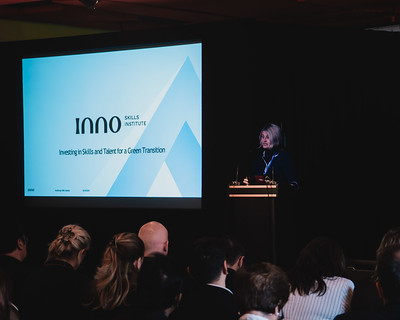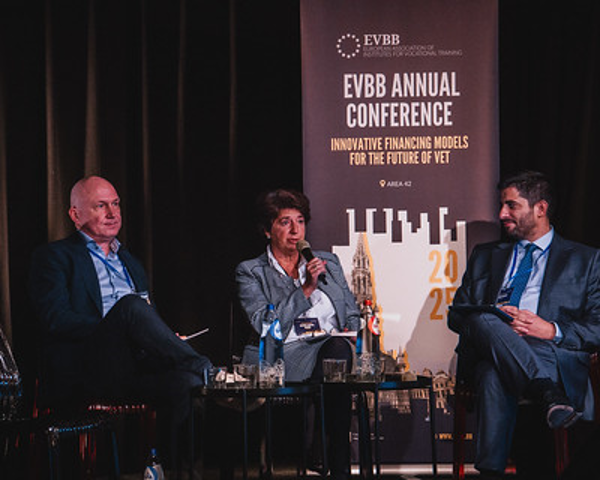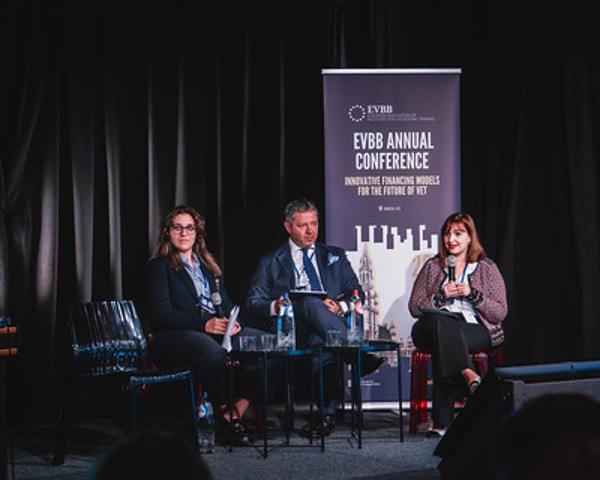Brussels, Belgium | Friday, October 3, 2025
EVBB hosted its 2025 annual conference, focusing on the crucial topic: “Innovative financing models for the future of VET.” Held in Brussels, this event brought together policymakers, institutional innovators, and VET financing experts to address a key challenge: financing inclusive, future-ready VET systems that can promote Europe’s social and economic resilience.
Key Takeaways: Why Funding is the Foundation of Future Skills
The conference determined that future funding decisions must directly support the green and digital transition and align investments with social impact and equity. The discussions charted a course for systemic change in how vocational training courses are funded across Europe.

High-Level EU Strategy and Political Vision
The day began with interesting insights from European leaders:
- Eleonora Meleti, Member of the European Parliament, gave a keynote speech highlighting “Why Funding Is Important for the Future of Education and Vocational Training: Innovation, Inclusion, Impact.” The speaker stressed that the financing structure must prioritize innovation, inclusion, and impact to make VET a career pathway of first choice.
- Ruth Paserman, from the European Commission’s DG EMPL, provided crucial insights on “Investing in the Future of Skills in Europe,” detailing EU funding priorities and the new multiannual financial framework (MFF). The lecturer emphasized the need for bold models to align education investment with measurable social and labour market outcomes.

Unlocking Private and Public Investment
One of the central themes of the conference was the strengthening of mixed financing models:
- Public-private partnerships (PPPs) in VET: a significant panel discussed how the private sector can contribute significantly to vocational education and training ecosystems. This discussion featured prominent voices from across the ecosystem, including Beatrice Bellet (MUNDUS), Martina Winkler (Enabel), Bart Claes (EPOS), Dr. Joe Collins (Education and Training Boards Ireland), and Ivory Hackett-Evans (TUI Care Foundation). The session tackled how the private sector can meaningfully co-invest and co-create VET ecosystems.
- Centers of professional excellence: The discussion on expanding PPPs for sustainable skills ecosystems was explored in depth during a session presented by Miriam Korstanje of Katapult. The need of a new robust vocational and professional education to build a sustainable future was presented.
- Key financial instruments: Representatives from the European Investment Bank (EIB) and the European Investment Fund (EIF), including Lucia Brajkovic (EIB) and Ines Rodrigues (EIF), led a session dedicated to the topic of “Unlocking Investment in Skills”, detailing how the European Investment Bank and European Investment Fund utilize a unique approach able to de-risk and mobilize capital for VET projects.
- Finance for the green transition: Oana Penu from EIT InnoEnergy addressed the crucial topic of “Mobilizing Investments for Europe’s Green Transition,” highlighting innovative funding solutions specifically for green skills development and energy transition technologies within VET.
Global Lessons and Implementation in Action
The conference provided both a macro and micro view of innovative financing, presenting international and national insights.
- Global insights: Achim Schmillen from the World Bank provided important “Global Lessons on Financing Education and Vocational Training,” offering an international development perspective.
- National strategies: A dedicated session presented best practices in “Innovative Financing in Action” from key EU Member States and partners, including the Ministries of Education of France, the Basque Government, Latvia, and Ukraine. They showcased successful VET funding reforms at the national and regional level. Concrete examples of ongoing investments were presented by Diomidis Georgas (AKMI), Mario Frank (Brainymotion), and Dolores Sanchez Bengoa (HDWM).
- Industry and consulting: strategic partners, including Ali Rashidi (Folkuniversitetet), Maria Slamari (Deloitte), and Iannis Voutsinos (PwC Greece), Sabrina Di Ruggiero (Schuman Associates) participated in a panel discussion on the key topic of “The Role of Consultancy in Defining Funding Models,” providing forward-looking perspectives. Concrete examples were presented by industry partners such as Florence Magee (Skillnet Ireland) on co-creation and co-investment with industry.

Project Walk Showcase: Innovation on the Ground
The EVBB annual conference was complemented by a walk and exhibition, which showcased a range of pioneering EU-funded initiatives demonstrating how targeted investments can build more sustainable and inclusive vocational education and training systems.
Notable projects included those focusing on the inclusion and mobility of vulnerable groups, such as DigiLang by ipcenter.at GmbH and WeCare4U. DigiLang supports the inclusion of non-native speakers by integrating digital tools into language training, a key factor for success in VET and the labor market. Similarly, WeCare4U focuses on developing intercultural skills training for foreign healthcare workers, addressing the challenges of cultural integration, and promoting diversity in essential sectors (funded by Erasmus+).
Projects dedicated to the dual transition (digital and green) also played a prominent role. The SECOVE (Sustainable Energy Centres of Vocational Excellence) project by Politeknika Txorierri illustrates how CoVEs can align VET with technological trends in the field of clean energy, using strategies such as virtual reality-based learning units and partnerships between businesses and educational institutions (Erasmus+ CoVE). In line with this approach, the DIGITAL TWIN on Smart Manufacturing project presents innovative approaches to the virtualization of industrial systems in line with Industry 4.0, offering modular e-learning courses and micro-credentials to certify new digital and green skills (ERASMUS+).
Finally, the exhibition presented initiatives focused on internationalization and capacity building. CG – International of the Asociación Mundus is working to strengthen the capacity of VET teachers to provide effective international career guidance and promote essential public-private partnerships (PPPs). The Palestine-Jordan Dual Model for Vocational Education and Training, presented by the Instituto Superior Técnico, highlights efforts to establish new dual VET models in the Mediterranean region through curriculum design and European partnerships (Erasmus+).
This Project Walk has demonstrated that innovative funding directly translates into scalable, high-impact educational solutions across Europe and beyond.
The EVBB 2025 Annual Conference was a powerful call to action, providing a blueprint for vocational education and training institutions to secure the funding necessary for future success.

